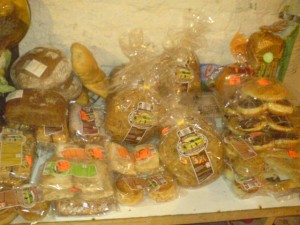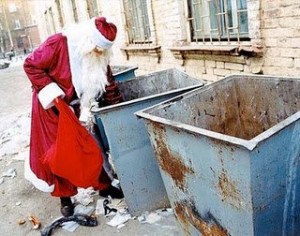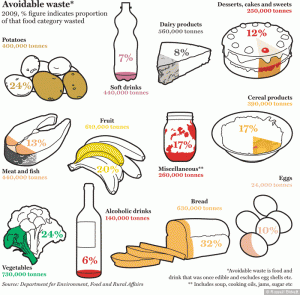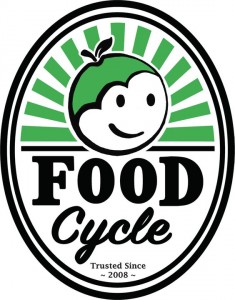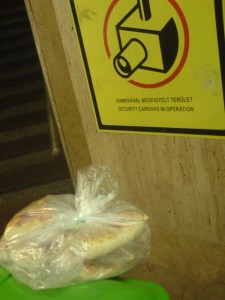
The new film ‘I Love Trash’ is a documentary that follows two friends as they live for three months by getting everything they need out of the trash. They arrive at an unfurnished apartment with the clothes on their back and a flashlight, and we slowly see them decorate their apartment and make clothes from things they’ve found in dumpsters. The film is a compelling journey of two friends as they make a life out of what others throw away, calling into question our society of consumption.
I Love Trash | Watch the Documentary Film Free Online | SnagFilms
Monthly Archives: December 2011
‘I Love Trash’ Documentary Covers The Art Of Dumpster Diving
HowTo
A blog by a Robin Hood of freeganism who is called Secret Freegan. This person collects food leftovers and distributes them among homeless. Tips, tricks about dumpster diving, and daily freegan life HERE.
Wasted Food

“Americans waste more than 40 percent of the food we produce for consumption. That comes at an annual cost of more than $100 billion. At the same time, food prices and the number of Americans without enough to eat continues to rise”.
This is an excerpt from a blog WastedFood by an American journalist who is writing about food wasting in the USA. Enjoy reading WASTEDFOOD.
Dumpster Diving. X-mas Edition
 As December 25 is Sunday, we decided to go dumpster diving that night. As we did not have much time, we just checked several streets in teh 7th district. We went there around midnight. We found some toys, lamps, clothes and a lot of church candles. Of course, there was a lot of X-mas package in the trash, but we did not take it. Later on, as it got even later at night, or rather Monday morning, we went to Aldi in the 9th district to check the trash there.
As December 25 is Sunday, we decided to go dumpster diving that night. As we did not have much time, we just checked several streets in teh 7th district. We went there around midnight. We found some toys, lamps, clothes and a lot of church candles. Of course, there was a lot of X-mas package in the trash, but we did not take it. Later on, as it got even later at night, or rather Monday morning, we went to Aldi in the 9th district to check the trash there.

We decided to do so as when I was around the supermarket earlier on Sunday I have discovered 5 trash bags full with good bread and pastry that was supposed to expire 2 days later, on Decemebr 28. So, as we came to the supermarket, the bags were still there, and apparently, nobody even discovered their existance, although I saw several dumpster divers in that area before. So, we took the bread to the Club, as well as 1 trash bag full of bread with us to make “guerilla breading”. We just left the bread on the ram and bus stops in the 9th and the 8th districts. We were doubting how much time it would take for the bread to be taken from the stops. On the first tram stop where we left the bread, it disappeared in less than 5 minutes. While we were waiting for the tram, we were observing the people collecting the bread.
This was the first time we find ANYTHING in this supermarket.
Reclaiming Waste
Reclaiming wasteI Sara Wingate GrayI Department of Information Studies, UCLFood and drink is bigbusiness. The annualestimated market for UKfood and food servicesjust to the public sectoris worth more than £2billion, with UK householdexpenditure estimated at£95.1 billion.The 2010 DEFRA Food Statistics Pocket-book1 estimates that of the 11.3 milliontonnes which constitute waste inthe UK household supply chain,8.3 million tonnes is foodwaste alone.More than 60% ofthis food and drinkhousehold wastewas in fact fit to beconsumed at somepoint prior to itsdisposal. Thismeans that ofthe 8.3 milliontonnes added tothe food waste chainby UK households, 5.3 milliontonnes of this food would have beenable to be eaten if better food man-agement in the home had taken place,including appropriately dealing withleftovers (defined as food and drink pre-pared and/or served but not consumed),and food and drink disposed of due to itnot being used in a timely fashion (de-fined as either passing a use-by date, orgoing mouldy)2.Food waste is a difficult subject, notleast because outcomes of methods ofcollection, reclamation, recycling, anddisposal in this process can generatefurther ‘waste’ products themselves(such as greenhouse gas emissionsfrom, for example: burning of fossilfuels for transportation; use of nitro-gen fertiliser in agriculture; emissionsfrom cattle).Dealing with waste, and food waste inparticular, is therefore anespecially difficult process,but I’d like to suggest thatone of the underlyingproblems to findinga solution here isthat our understand-ing may be beingmasked by thedefinitions andterminology that arein use. The definition of‘waste’, according to theUnited Nations StatisticsDivision is: “materials thatare not prime products (thatis products produced for themarket) for which the generator has no further use in terms of his/her ownpurposes of production, transformationor consumption, and of which he/shewants to dispose”.For me, this definition demonstratessome of the fundamental assump-tions and limits in thinking that occurwhen we only think of waste in this way,particularly since ‘one woman’s wasteis another woman’s treasure’. That isto say, this definition only allows forthe fact that if the producer of ‘waste’deems it as such, then that is what itbecomes, thus entering the waste man-agement chain without further discus-sion. However, it is entirely possible thatwhat is viewed as ‘waste’ by the instiga-tor of production may in fact be viewedas ‘product’ or ‘consumable’ or ‘valu-able’ by another.Here, I speak from direct experience ofinvestigating the amount of food deter-mined as ‘waste’ by a number of su-permarkets in three different countries,spending time essentially going throughthe garbage bins to collect food prod-ucts deemed by these supermarkets as‘waste’. In London, San Francisco, andLeipzig, I saw first-hand the amount offood being ‘wasted’ in this way, whichspecifically included:•Fruit in cotton net bags where oneitem has become inedible and becauseof selling practices, the whole bag mustbe removed and deemed waste. ≥•Pre-packaged fruit, which has beensliced up for ‘convenience’, has a much more limited shelf-life andtherefore more quickly becomes awaste product if left unsold. ‘Readymeals’ also fall into this category.•Vegetables which have reached their‘sell-by’ date, but which are still en-tirely edible must be thrown out due toworking and legal practices.These are just a few examples of themany products entering the food wastechain via supermarkets every day of theweek across individual towns and citiesspanning the entirety of Europe andNorth America. What was most disturb-ing to me in this investigation was theactual quality of food that was deemedto be worthy of definitions of ‘waste’, asin almost every bin I investigated I foundfood products entirely edible, in someinstances without blemishes, mould orbroken surfaces at all. Most shocking ofall, the quantity of ‘food waste’ avail-able in this way meant that for severalmonths at a time I was able to live en-tirely from reclaiming this produce.Of course, there are no quick and easysolutions to this issue, and I would notlike to suggest that the answer is simplyto encourage everyone to nip behindtheir local supermarket every eveningpost-midnight and launch themselvesinto a green, blue or brown bin. Instead,what I’d like to introduce is the idea thatto solve these issues we need to changeour practices to engage more fully withthe concepts of sharing, which also in-volve the notions of re-use, reclamationand recycling, and I take the Public Li-brary sector as inspiration here, engag-ing as it does with the ideas of recyclingand re-use via the very public processof lending, borrowing, and re-using of‘products’ and ‘information’, a stream-lined process which occurs in publiclibraries across the UK every day.Instead of introducing these conceptsto the food waste cycle we are allow-ing a destructive short-term approachto drive the way the process operates,whereby much “of the activity under-taken by retailers regarding their foodwaste so far seems to have focussedon landfill diversion rather than wasteprevention”3, with the result that furtherwaste and costs are generated, not less.Ultimately, of course, a large part of thefood waste dilemma, as the statisticshave shown us, also comes down tous as individuals in the households welive in. Next time you’re in the super-market or your local outdoor market,or indeed your kitchen, spend sometime thinking about how you can reducewhat you waste. As one contributor tothe food waste chain might say, everylittle helps.
http://www.2degreesnetwork.com/preview/resource/defra-food-waste-analysis/
Foodcycling
In the UK they even have initiatives that cook from the trash! Read more about FoodCycling from Lara Glass.
Foodcycling by Lara Glass (from The Food Junctions Cookbook, http://www.casa.ucl.ac.uk/fj/)
The problem: 400,000 tonnes of surplus food are wasted every year; 4 million people areaffected by food poverty in the UK; and over 2.4 million people in the UK are currently searching for work.
An organisation called FoodCycle is tackling this by combining surplus foodwith volunteers and a free kitchen space to create nutritious meals and positive social change in the community. In late September 2010, seven project leaders found an unused kitchen space, supermarkets eager to be involved inreducing their land-fill footprint, and agroup of volunteers. This was the for-mula needed for cooking to begin in the Bromley-by-Bow Centre every Sunday lunchtime.
The outcome: a free, nutritious, recycled meal and the sparks of community spirit being built. Since then, we have cooked for about 30 people each week. The kitchen is energised with chopping, peeling, frying and sizzling – all produced with food that would have landed on the dump because the packaging wasn’t sealed, or the product had passed its sell-by date. We prove this fresh produce can make delicious vegetarian meals and through our meals are raising awareness of the waste that is unnecessary. This isn’t just about providing a café service to the people we cook for. It’s about creating a welcoming social environment that people enjoy coming to each week as much as it is about providing nutritious food and reducing food waste. What’s more, a tradition has sprung up of reading poetry overpudding. The project is developing into something that is valued by a large number of the local community. Not only has the Sunday lunch shaped new friendships, but beneficiaries are being empowered through their involvement in preparing, cooking, serving and clearing while working together to produce a creative meal from a mix of vegetables and fruit.
Free Pizza
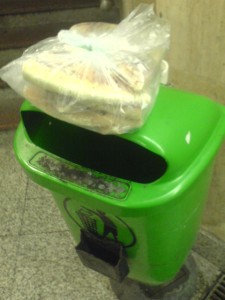 Tonight we were walking with a friend in the city centre, and as we were crossing Astoria we saw a man putting two packages of pizza on the small trash bins in the underground crossing. In each package you could find 7 huge pieces of vegetarian pizza. We took one package and went to Blaha square to give the pizza to the homeless. We found exact number of homeless that corresponded to the number of pizza pieces left – 6 (OK, I was hungry and ate 1 piece on the way to Blaha).
Tonight we were walking with a friend in the city centre, and as we were crossing Astoria we saw a man putting two packages of pizza on the small trash bins in the underground crossing. In each package you could find 7 huge pieces of vegetarian pizza. We took one package and went to Blaha square to give the pizza to the homeless. We found exact number of homeless that corresponded to the number of pizza pieces left – 6 (OK, I was hungry and ate 1 piece on the way to Blaha).
 50 simple ideas how to reduce food waste
50 simple ideas how to reduce food waste 